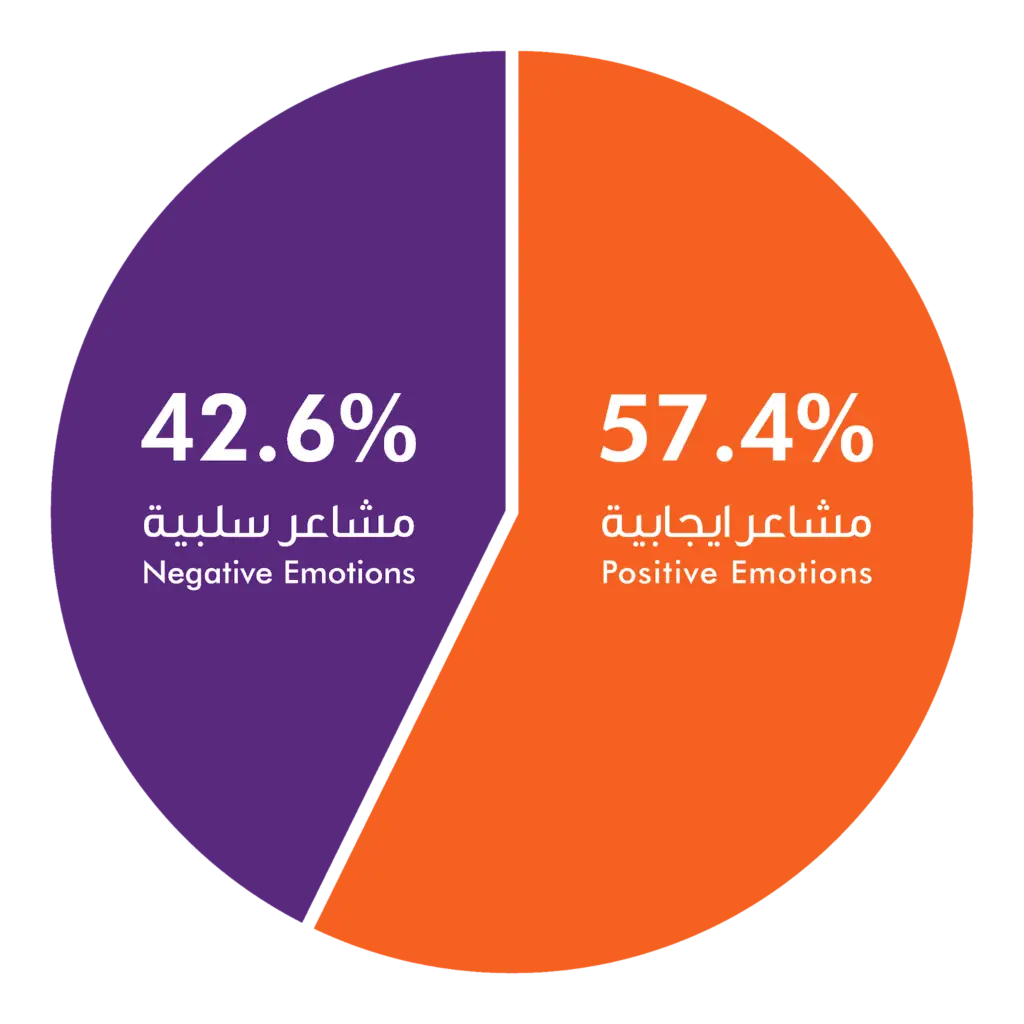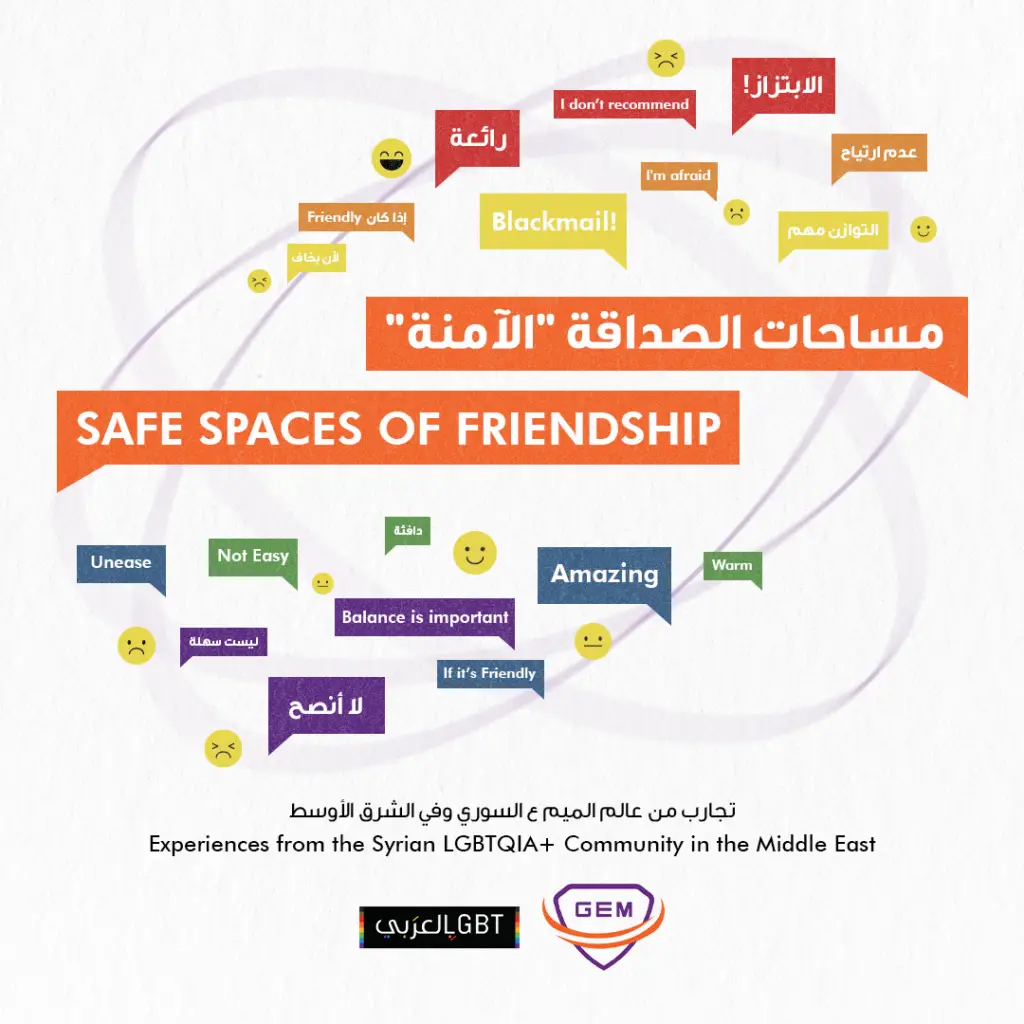“Finding friends was a major challenge in a place like Idlib, Syria, where I live. However, I was able to connect online with people who share the same identity and experiences as me.” – Haidar, Idlib.
“I don’t advise anyone in Iraq to build relationships with LGBTQIA+ individuals. With every arrest, the names of others are added to lists for assassination and detention.” – Milo, Iraq.
Being an LGBTQIA+ individual in the Middle East often means being deprived of the most basic rights in life, of simple things like laughing with friends or even crying. The task of forming friendships and finding what are known as safe spaces sometimes becomes fraught with danger, and in other cases, can lead to death or imprisonment.
In this report, we guide you through the feelings of over 40 LGBTQIA+ individuals regarding their experiences in forming friendships and finding safe spaces, whether with fellow community members or with non-LGBTQIA+ individuals, along with their advice on the matter. We will categorize these feelings based on two dimensions: either negative or positive.
We selected the samples through an open survey directed at the LGBTQIA+ community in and from Syria and the Middle East in early September 2024. The participants were followers of the LGBT Arabic and the Guardians of Equality Movement platforms on social media. We asked the 67 survey participants to choose a preferred name, and we included participants from number 6 to number 60.
In psychology, feelings are defined as any attitude, thought, or judgment resulting from an emotion that an individual forms regarding a particular issue.
The responses regarding safe friendship spaces with LGBTQIA+ individuals totaled 47 answers, while the responses about safe friendship spaces with non-LGBTQIA+ individuals totaled 41 answers.
Have you been able to create safe friendship spaces with other LGBTQIA+ individuals? What is your advice on this?
No: 20
Yes: 27

Have you been able to create safe friendship spaces with non-LGBTQIA+ individuals? What is your advice on this?
No: 24
Yes: 17

Friendships with LGBTQIA+ Individuals:
Haidar, a resident of Idlib (a pseudonym), believes the most important advice is to be cautious in choosing whom to share details of your life with. He points to the internet as a “great” tool for building relationships but warns about the risks of exploitation or blackmail.
Oscar agrees with Haidar that the “best” way to form friendships is through the internet, and he believes it is not advisable to get to know neighbors or coworkers. Another participant, under the name Apollo, states that he was only able to form friendships through the internet.
In Iraq, Milo’s advice was to avoid building relationships, even with LGBTQIA+ individuals, due to the frequent arrests and persecutions against the LGBTQIA+ community: “I don’t advise anyone in Iraq to build relationships with LGBTQIA+ individuals, as with every arrest, the names of others are added to lists for assassination and detention.”
Friendships with Non-LGBTQIA+ Individuals: “I’m afraid people won’t accept it”:
Hassan says that he has friendships with both LGBTQIA+ individuals and non-LGBTQIA+ individuals, but they are not many: “Because I’m afraid many people won’t accept it.” Meanwhile, participant number 13, who did not choose a name, believes that creating friendship spaces with non-LGBTQIA+ individuals is important, “If they are friendly, otherwise it’s dangerous.”
Elias has a different experience. He says, “There is discomfort with non-LGBTQIA+ individuals,” and for this reason, his friendships have been limited to members of the LGBTQIA+ community, whom he describes as having become like his family. As for Zein, he was able to form a “warm” and safe space with many non-LGBTQIA+ individuals and LGBTQIA+ community members. “Look inside yourself, and you will find your safe space and the people who truly love you.”
“Balance and Self-Respect in Creating Safe Spaces”:
Emma says that when she began seeking safe spaces both within and outside the LGBTQIA+community, she was still in Syria. She notes that her love and respect for herself, along with being more open with close friends, led her to choose safe spaces with certain people. However, she adds that this was not “always easy or comfortable.”
Radhika, a drag performer, also shares that she has formed friendships with both LGBTQIA+individuals and non-LGBTQIA+ individuals. Radhika’s advice stems from an inner sense of self, as she believes that inner “balance” is essential for building friendships and creating a safe space.
The previous findings highlight the following:
LGBTQIA+ individuals face difficulties in forming friendships within their own community due to several factors, the primary one being fear of societal judgment and authority. This difficulty increases when trying to create safe friendship spaces with non-LGBTQIA+individuals.
As shown in Chart 1, more than half of the participants expressed positive feelings toward creating a safe friendship space with other LGBTQIA+ individuals.
In Chart 1, more than one-third of participants expressed negative feelings toward forming friendships with other LGBTQIA+ individuals. In the survey, some mentioned an inability to do so due to security and social conditions, among other reasons, while others felt discomfort with the idea, and some due to a negative past experience.
Chart 2 shows that 40% of participants expressed positive feelings about creating friendship spaces with non- LGBTQIA+ individuals.
In Chart 2, more than half expressed negative feelings about forming friendships with non-LGBTQIA+ individuals. Responses to this question were fewer in the survey, and it appears that participants also conveyed discomfort with the idea due to fear, while some cited negative past experiences.
Background:
With the ongoing conflicts in the Middle East for over a decade, beginning with the Syrian revolution in 2011 and the subsequent war with its lasting consequences, as well as escalations in South Lebanon and Gaza, the social, economic, and legal conditions for LGBTQIA+ individuals have significantly deteriorated. This is especially evident in countries such as Syria, which, according to research by the Guardians of Equality movement, is considered the most dangerous country for LGBTQIA+ individuals. Similarly, in Iraq, legal amendments have been introduced to criminalize homosexuality, with the death penalty imposed on offenders. In Lebanon, political and religious leaders, such as the leader of Hezbollah, have incited hostility against LGBTQIA+ individuals, in addition to violent attacks by radical extremist groups targeting LGBTQIA+ people.
Recommendations:
The above highlights the necessity of understanding the needs and challenges faced by LGBTQIA+individuals in forming friendships and safe spaces, and the impact of these on their mental, emotional, and social well-being. This is crucial in the context of developing supportive initiatives and programs aimed at:
1. Building a Stronger Community and Closer Support Circles: Creating environments where everyone feels a sense of relative safety and belonging, especially for those living in areas like Syria, Lebanon, and Iraq.
2. Supporting the Mental and Emotional Health of LGBTQIA+ Individuals: Providing resources and programs that focus on enhancing the mental and emotional well-being of LGBTQIA+ individuals, addressing the unique challenges they face in these regions.

